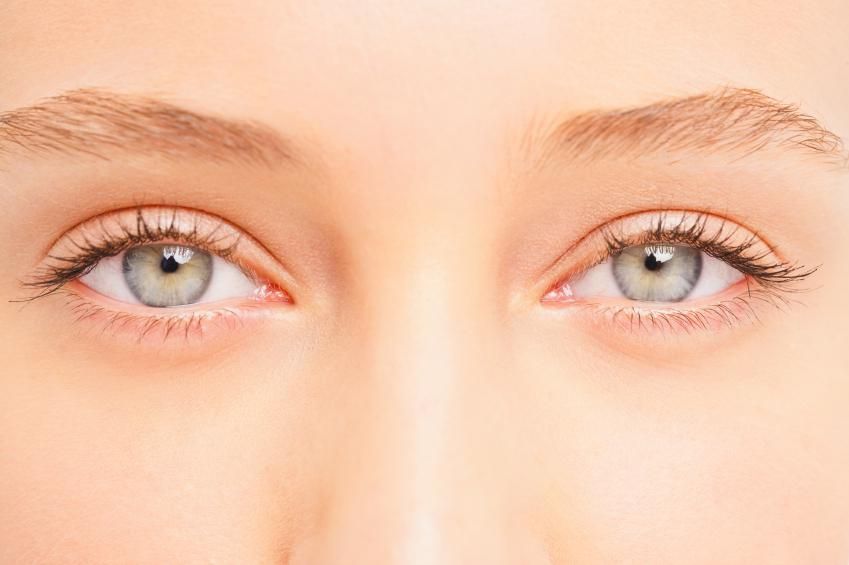Most people have eye problems at one time or another. Some are minor and will go away on their own or are easy to treat at home. Others need a specialist's care.
Whether your vision isn't what it used to be or never was that great, there are things you can do to get your eye health back on track.
See if any of these common problems sound familiar. And always check with a doctor if your symptoms are terrible or don't clear up within a few days.
Eyestrain
Anyone who reads for hours, works at a computer or drives long distances knows about this one. It happens when you overuse your eyes. They get tired and need to rest, just like any other part of your body.
If your eyes feel strained, give them some time off. If they're still weary after a few days, check with your doctor to ensure it isn't another problem.
Red Eyes
Your eyes look bloodshot. Why?
Their surface is covered in blood vessels that expand when they're irritated or infected. That gives your eyes a red look.
Eyestrain can do it, and so can a late night, a lack of sleep, or allergies. If an injury is a cause, get it checked by your doctor.
Red eyes could be a symptom of another eye condition, like conjunctivitis (pinkeye) or sun damage from not wearing shades over the years. If over-the-counter eye drops and rest don't clear it up, see your doctor.
Night Blindness
Is it hard to see at night, especially while driving? Is it tough to find your way around in dark places, such as movie theaters?
That sounds like night blindness. But, it's a symptom, not a problem in its own right. Nearsightedness, cataracts, keratoconus, and a lack of vitamin A all cause a type of night blindness that doctors can fix.
Some people are born with this problem, or it might develop from a degenerative disease involving the retina, which usually can't be treated. However, if you have it, you'll need to be extra careful in areas of low light.
Lazy Eye
Lazy eye, or amblyopia, happens when one eye doesn't develop properly. Vision is weaker in that eye, and it tends to move "lazily" around while the other eye stays put. It's found in infants, children, and adults and rarely affects both eyes. Treatment needs to be sought immediately for infants and children.
Lifelong vision problems can be avoided if a lazy eye is detected and treated during early childhood. Treatment includes corrective glasses or contact lenses and using a patch or other strategies to make a child use the lazy eye.
Cross Eyes (Strabismus) and Nystagmus
If your eyes aren't lined up with each other when you look at something, you could have strabismus. You might also hear it called crossed eyes or walleye.
This problem won't go away on its own. Sometimes you can go to vision therapy with an eye doctor to help strengthen the weak eye muscles. You'll often need to get an ophthalmologist, or eye surgeon specialist, to correct it surgically. You'll need to get an ophthalmologist, or eye specialist, to correct it.
With nystagmus, the eye moves or "jiggles" all the time on its own.
There are many treatments, including vision therapy, to make your eyes stronger. Surgery is also an option. Your doctor will examine your eyes to see which treatment might work best for you.
Colorblindness
When you can't see certain colors or can't tell the difference between them (usually reds and greens), you may be colorblind. It happens when the color cells in your eye (the doctor will call them cone cells) are absent or don't work.
When it's most severe, you can only see in shades of gray, but this is rare. Most people who have it are born with it, but you can get it from certain drugs and diseases later in life. Your doctor can tell you what's to blame. Men are much more likely to be born with it than women.
Your eye doctor can diagnose it with a simple test. There's no treatment if you're born with it, but special contacts and glasses can help some people tell the difference between certain colors.
Uveitis
This is the name for a group of diseases that cause inflammation of the uvea. That's the middle layer of the eye that contains most of the blood vessels.
These diseases can destroy eye tissue and even cause eye loss. People of all ages can have it. Symptoms may go away quickly or last for a long time.
People with immune system conditions like AIDS, rheumatoid arthritis, or ulcerative colitis may be more likely to have uveitis. Symptoms may include:
• Blurred vision
• Eye pain
• Eye redness
• Light sensitivity
See your doctor if you have these symptoms and they don't go away within a few days. There are different kinds of treatment for uveitis, depending on the type you have.
Presbyopia
This happens when you lose the ability, despite good distance vision, to see close objects and small print.
After age 40 or so, you may have to hold a book or other reading material farther away from your eyes to make it easier to read. Sort of like your arms is too short.
Reading glasses, contact lenses, LASIK, which is laser eye surgery, and other procedures can be used to restore good reading vision. Learn more about LASIK eye surgery and presbyopia.
Floaters
These are tiny spots or specks that float across your field of vision. Most people notice them in well-lit rooms or outdoors on a bright day.
Floaters are usually normal, but they sometimes can signify a more serious eye problem, like retinal detachment. That's when the retina at the back of your eye separates from the layer underneath. When this happens, you might also see light flashes along with the floaters or a dark shadow come across the edge of your sight.
If you notice a sudden change in the type or number of spots or flashes you see or a new dark "curtain" in your peripheral vision, go to your eye doctor as soon as possible.
Dry Eyes
This happens when your eyes can't make enough good-quality tears. You might feel like something is in your eye or like it's burning. Rarely, in severe cases, extreme dryness can lead to some loss of vision. Some treatments include:
• Using a humidifier in your home
• Special eye drops that work like real tears
• Plugs in your tear ducts to lessen drainage
• Lipiflow, a procedure that uses heat and pressure to treat dry eyes
• Testosterone eyelid cream
• Nutritional supplements with fish oil and omega-3
If your dry eye problem is chronic, you may have dry eye disease. Your doctor could prescribe medicated drops like cyclosporine (Cequa, Restasis) or lifitegrast (Xiidra) to stimulate tear production.
Excess Tearing
It has nothing to do with your feelings. However, you might be sensitive to light, wind, or temperature changes. Try to protect your eyes by shielding them or wearing sunglasses (go for wraparound frames -- they block more wind than other types).
Tearing may also signal a more serious problem, like an eye infection or a blocked tear duct. Your eye doctor can treat or correct both of these conditions.
Cataracts
These are cloudy areas that develop in the eye lens.
A healthy lens is clear like a camera's. Light passes through it to your retina -- the back of your eye where images are processed. When you have a cataract, the light can't get through as easily. The result: You can't see as well and may notice glare or a halo around lights at night.
Cataracts often form slowly. They don't cause symptoms like pain, redness, or tearing in the eye.
Some stay small and don't affect your sight. However, if they do progress and affect your vision, surgery almost always works to bring it back.
Glaucoma
Your eye is like a tire: Some pressure inside it is normal and safe. But levels that are too high can damage your optic nerve. Glaucoma is the name for a group of diseases that cause this condition.
A common form is primary open-angle glaucoma. Most people who have it don't have early symptoms or pain. So it's essential to keep up with your regular eye exams.
It doesn't happen often, but glaucoma can be caused by:
• An injury to the eye
• Blocked blood vessels
• Inflammatory disorders of the eye
Treatment includes prescription eye drops or surgery.
Retinal Disorders
The retina is a thin lining on the back of your eye that is made up of cells that collect images and pass them on to your brain. Retinal disorders can damage the retinal cells and block this transfer. There are different types:
• Age-related macular degeneration refers to a breakdown of a small portion of the retina called the macula.
• Diabetic retinopathy is damage to the blood vessels in your retina caused by diabetes.
• Retinal detachment happens when the retina separates from the layer underneath.
It's essential to get an early diagnosis and have these conditions treated.
Conjunctivitis (Pinkeye)
In this condition, the tissue that lines the back of your eyelids and covers your sclera gets inflamed. It can cause redness, itching, burning, tearing, discharge, or a feeling that something is in your eye.
People of all ages can get it. Causes include infection, exposure to chemicals and irritants, or allergies.
Wash your hands often to lower your chance of getting it.
Corneal Diseases
The cornea is the clear, dome-shaped "window" at the front of your eye. It helps to focus on the light that comes in. Disease, infection, injury, and exposure to toxins can damage it. Signs include:
• Red eyes
• Watery eyes
• Pain
• Reduced vision, or a halo effect
The main treatment methods include:
• A new eyeglasses or contacts prescription
• Medicated eye drops
• Surgery
Eyelid Problems
Your eyelids do a lot for you. They protect your eye, spread tears over its surface, and limit the amount of light that can get in.
Pain, itching, tearing, and sensitivity to light are common symptoms of eyelid problems. You might also have blinking spasms or inflamed outer edges near your eyelashes.
Treatment could include proper cleaning, medication, or surgery.
Vision Changes
As you get older, you may find that you can't see as well as you once did. That's normal. You'll probably need glasses or contacts. You may choose to have surgery (LASIK) to correct your vision. If you already have glasses, you may need a stronger prescription.
Other, more severe conditions also happen as you age. For example, eye diseases like macular degeneration, glaucoma, and cataracts, can cause vision problems. Symptoms vary a lot among these disorders, so keep up with your eye exams.
Some vision changes can be dangerous and need immediate medical care. Anytime you have a sudden loss of vision, or everything looks blurry -- even if it's temporary -- see a doctor right away. Go to the emergency room or call 911.
Problems With Contact Lenses
They work well for many people, but you need to take care of them. Wash your hands before you touch them. Follow the care guidelines that came with your prescription. And follow these rules:
• Never wet them by putting them in your mouth. That can make an infection more likely.
• Make sure your lenses fit properly so they don't scratch your eyes.
• Use eye drops that say they're safe for contact lenses.
• Never use homemade saline solutions. Even though some lenses are FDA-approved for sleeping in them, doing so raises the risk of a severe infection.
If you do everything right and still have problems with your contacts, see your eye doctor. You might have allergies, dry eyes, or be better off with glasses. Once you know what the problem is, you can decide what's best for you.











 Photo by
Photo by 








